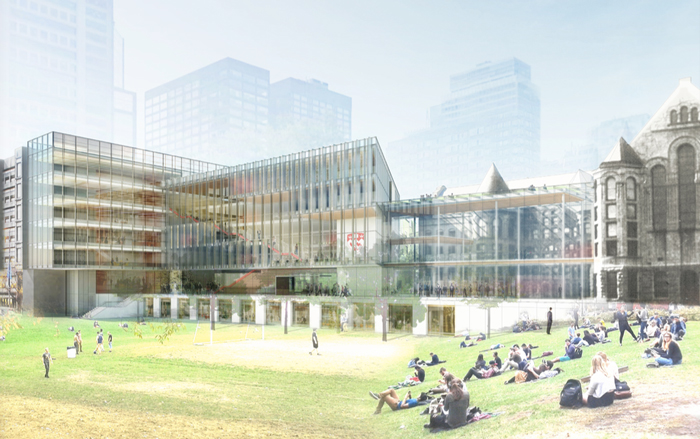Fiat Lux, which means ‘Let there be light’, is a renovation project for the Humanities and Social Science Library, which includes the McLennan and Redpath buildings. It aims to equip library facilities with state-of-the-art technology, in line with modern needs. The project is estimated to last five years and is to be completed in phases. In the first phase, a robotically accessible underground storage facility will be built. Then, Redpath hall and library will be revamped, and connected to McLennan. Finally, McLennan library will be renovated.
So far, no date has been set for the start of the Fiat Lux library construction, for which architecture firms ÉKM Architecture (ÉKM) and Shepley Buålfinch published a Master Plan in October 2015. The project seeks to modernize the McGill Humanities and Social Sciences Library with more open architecture. The construction, which is supposed to span a five-year period and is estimated to cost $180 million, requires more fundraising before it can begin.
The lack of financial resources has delayed the call for tenders for the construction contract. Colleen Cook, Trenholme dean of Libraries, is currently working on elaborating the layout of the financing strategy.
“This project will cost $180 million […], but you fundraise by getting to know people and then after you form a relationship, then you ask [for funding],” Cook said.
The Library Improvement Fund (LIF) is an ongoing initiative that raises money annually to be donated to the library. LIF Commissioner Malcolm McClintock believes potential donors might be more willing to give their seal of approval and to supply financial support if they had the guarantee that students would contribute financially to the project.
“It’s been strongly suggested that [signature donors are] looking for financial support from the students, in terms of a fee,” McClintock said.
Ann Vroom, chair of Friends of the Library, a non-profit organization run by volunteers whose mission is to cultivate interest in McGill’s libraries and to provide support to its services and activities, is also looking for money through different avenues.
“We are hoping [the financing] will be a combination of private philanthropy, university contributions, and some support from the students,” Vroom said.
McClintock is opposed to the idea of students partly financing Fiat Lux, especially since they are not well-informed about the project.
“I’ve actively said that I think this isn’t something that students should be paying for,” McClintock said. “[….] I see how in terms of fundraising that’s a very good tactic. I think it’s a just a little bit difficult to ask right now because people are so confused about what’s going on with Fiat Lux.”
Friends of the Library are currently using various methods to entice donors for the Fiat Lux project, such as alumni.
“How the Fiat Lux project will be financed is what is being studied right now,” Vroom said. “[….] Through a series of salons in alumni homes across North America, where the Dean [Colleen Cook] can engage people with her story of the enduring value of libraries through the ages, we are lighting a fire of excitement about McGill’s plans for a re-envisioned library.”
No plans have been elaborated yet to compensate for the noise and lack of space that will result from the construction.
“I anticipate that it won't be any worse than what people have experienced already,” Cook said, referring to the construction on McTavish.
François Emond, an architect from ÉKM, explained the first phase of construction. It consists of transferring the library collection to the Automated Storage and Retrieval System, a storage section under the Lower Field where students will be able to send robots to retrieve books.
“The storage unit is the facilitator, that’s the thing that allows us to maintain the functionality of the library while all of the work goes on,” Emond said.
Cook estimated that the noise caused by the digging for the storage unit will last for a short time. The library will try to keep its services as accessible as possible.
“It would only be a day, when you dynamite the bedrock,” Cook said. “[….] There will be some disruption, but […] we will do our absolute best to keep the buildings open and to mitigate the construction to all our users.”
Both McClintock and Emond have expressed their desire for students to be involved in the designing process of the new library.
“We try to get as much student feedback as possible and I think we’d be able to use the research we’ve got this year and the years to come to better manipulate what the Fiat Lux would be,” McClintock said.









